Merlin Plastics is primed to collaborate on a closed loop for packaging
Founder Tony Moucachen is ready to work with the entire plastics supply chain to develop a sustainable circular economy.
The Canada Plastics Pact (CPP), established this past spring, is part of the Ellen MacArthur Foundation’s Plastics Pact Network – the most ambitious action that has ever been taken by the global plastics industry to solve our worldwide plastic waste problem. For the first time, the CPP brings together the entire plastics industry supply chain in Canada – from producers to goods and packaging manufacturers and retailers, to collectors and recyclers – all with a shared vision of a circular economy for plastics in which all varieties stay in the economy and out of the environment.
Because the packaging stream accounts for nearly 50 percent of all plastic waste produced in Canada, it is the immediate focus of the CPP’s collective efforts. Initial goals, aiming for 2025, are to not only have significantly less plastic packaging in the system overall, but also to make it more sustainable for recyclers to recover the packaging that does remain in our system.
Among founding signatories from the recycling industry is Vancouver-based Merlin Plastics, Canada’s largest diversified plastics recycling company. According to founder and President Tony Moucachen, getting the design-for-recycling element figured out is the right place to start, and they are primed to collaborate with all stakeholders.
Moucachen also believes that in order to achieve a truly circular economy, every business, organization and government entity that has a stake in the sector has to be involved in making collaborative decisions to help build a system, from the start, that will work for all parties.
A history in plastics innovation
Merlin Plastics started in 1987 in a 2,000-square-foot warehouse in Delta, B.C., and now has over a million square feet of recycling operations between six plants: two in B.C., and one each in Alberta, Ontario, California and Oregon.
“It was a very humble start-up,” explains Moucachen. “We started with two people. Since then we have built a team of skilled workers with a wide range of technical skills including mechanical, electrical and chemical skills. We have developed and patented some of our pre-washing processes, and were the first on the west coast of North America to get FDA approval for PET for use in food grade applications. We were also the first in Canada to receive an FDA approval for our high-density product, HDPE, for use in food grade applications.”
Moucachen is pleased to work in an industry that is aligned with his environmental values. The baseline concept in Merlin’s business model is that packaging, regardless of whether it is plastics or not, should not end up in our natural environment. The model is also based around three core values: environmental, social and fiscal responsibility.
“The question is, how do you achieve those goals?” he asks. “You achieve them by working with like-minded organizations throughout the value chain, and by building an in-house team of employees that is also like-minded in its approach. Our industry throughout the value chain needs to nurture a culture of collaboration.”
“For any business to grow, its goals must be aligned with the goals of the community, which are responsible for driving government policy. Having the best team is critical, but working toward the same community goals is equally important.”
Adapting to a community’s needs
Most of Merlin’s incoming plastics volume comes from community collection programs. They also get material from IC&I sources and collectors. They receive both rigid and flexible plastics, most commonly numbers 1 (PET or Polyethylene Terephthalate), 2 (HDPE or high-density polyethylene), 4 (LDPE or low-density polyethylene) and 5 (PP or polypropylene). They don’t recycle #3 plastic (PVC or polyvinyl chloride).
Moucachen says they respect each community’s decision on how they choose to collect material and how they choose to finance their collection efforts. To Merlin, how material is collected is a community decision, and one that is based on the size of the community, the resources they have in place and a variety of other factors. Merlin supports whatever collection decisions the community makes and will provide solutions to suit them. If the community has an economy of scale to sort the product themselves, then Merlin will buy the sorted material, and if they do not have that economy of scale to be able to do the sorting themselves, then Merlin can provide the sorting service to them.
At the end of the day, Merlin’s fundamental aim is to ensure that discarded packaging does not end up in our natural environment.
Access the full story at Recycling Product News.



